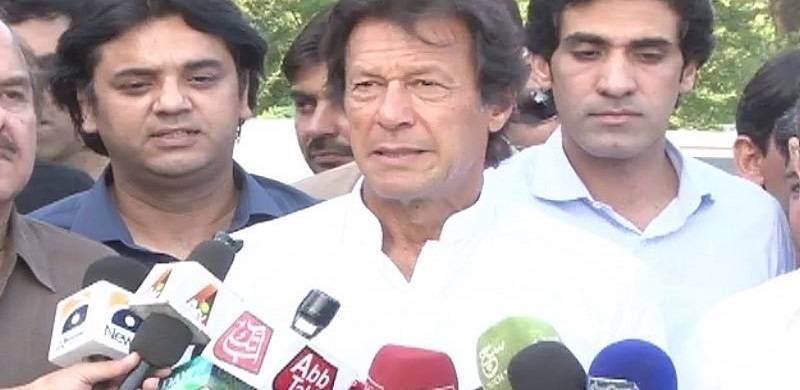
I distinctly recall that Prime Minister Imran Khan, while holding a press briefing with US President Donald Trump, in July 2019, said that the way he had been receiving criticism from media was unprecedented, so the allegations about curbs on the press in Pakistan were a joke. I do not know on what grounds Prime Minister Khan expressed such views in front of the international media, but I am sure that he would not have faced the media criticism which previous governments had faced. In general, the media keeps an eye on the activities of governments and the happenings in and around society. Unfortunately, since the PTI had come in power, an undeclared media censorship is going on, and now it seems that the government has completely decided that the media must face severe backlash for criticism.
Although Prime Minister Imran Khan keeps saying that the media in Pakistan during the PTI's government enjoys more freedom than that of Europe and Western countries, reality tells a different story.
As to how much the media is free under the PTI government can be observed and analyzed from an article by Hannah Ellis-Petersen and Shah Meer Baloch published in The Guardian on November 5, 2019. The writers of the article say:
Journalists, activists, authors, and politicians spoke to the Guardian of a climate of “extreme fear and self-censorship”, and the suppression of opposition political voices, even worse than during the military dictatorship of General Zia, who oppressively ruled Pakistan between 1977 and 1988.
Likewise, in October last year, the state's media regulator PEMRA issued a directive to all TV anchorpersons that none of them should give their own analysis or express personal views in their TV talk shows. The directive further stated that “anybody found breaching the directive will be fined up to 10 million rupees.”
The narrative about freedom of media was once again repeated by PM Khan during his sitting with some senior journalists/anchorpersons. During this media briefing, when a senior journalist Rauf Klasra started talking on the critical note that he had already been blacklisted by the government because he criticized some policies of the government some time ago, it was very clear to observe PM Khan's reaction that was full of anger. It was apparent from looking at Imran Khan’s facial expressions and his way of talking. But, simultaneously, it must be admitted, the tone used by some journalists, especially by Mohammad Malick, was also very arrogant, which should have been avoided. However, the same Imran Khan, who had been advocating the freedom of the press before he came in power, is now taking every possible action to curb the media and freedom of speech in the country.
Likewise, because of his continuous criticism on the PTI government, PM Khan had un-followed senior journalist Hamid Mir on Twitter, too. Though like every other individual, it is his (Prime Minister) right to follow or un-follow any person on twitter, the reason behind un-following should not be that a journalist criticizes any policy of the government. This kind of behavior cannot be expected, at least, from a person of the caliber where they aer holding the Prime Minister's office.
It is very unfortunate that during this critical time, when the whole world is under threat of COVID-19, rather trying to create an atmosphere of unity and collaboration, the PTI government is encouraging more controversies. On the one hand, the government has been reacting against the media since the PTI had come in power. At the same time, the state's accountability watchdog NAB is also in action against opposition parties, especially some leaders of PML-N and PPP. Simultaneously, consider the attitude of Prime Minister Imran Khan during the first video session of the Parliament, where he left without listening to PML-N leader Shahbaz Sharif and PPP chairman Bilawal Bhutto Zardari. The same attitude was adopted by both leaders, who also boycotted the session in reaction to Khan’s attitude. Our political leadership is simply not able to come out of this small box of hatred - even at such a critical time.
Likewise, the situation of media curbs under the Tabdeeli Sarkaar is clear for all to see: as to how some prominent anchorpersons were deprived of their jobs. At the same, Herald and Newsline magazines stopped their publications du to the miserable situation for the media. Interviews of opposition leaders like Maryam Nawaz, Asif Ali Zardari and Maulana Fazal-ur-Rehman were banned. The situation has reached a point where, even though the PTI government has presented a completely anti-people budget, it has not been discussed in the way that the media had been highlighting budgetary matters in previous governments.
The PTI government must realize as soon as possible that curbing the media and snatching the right to expression/speech is not a solution to suppress sane voices. Rather than creating any favorable conditions for the government, it can end up doing the exact opposite too. And if it is not the PTI behind the media censorship but some other power centre, this is a matter of concern for not only media persons but all the human rights defenders and who believe in freedom of expression, because a country cannot be called a democratic one until and unless freedom of expression is guaranteed.
